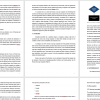Тема: MARKET AND NON-MARKET STRATEGIES FOR PARTNER RISKS MITIGATION: THE CASE OF RUSSIAN OIL AND GAS COMPANIES EXPANSION TOWARDS CHINA
Закажите новую по вашим требованиям
Представленный материал является образцом учебного исследования, примером структуры и содержания учебного исследования по заявленной теме. Размещён исключительно в информационных и ознакомительных целях.
Workspay.ru оказывает информационные услуги по сбору, обработке и структурированию материалов в соответствии с требованиями заказчика.
Размещение материала не означает публикацию произведения впервые и не предполагает передачу исключительных авторских прав третьим лицам.
Материал не предназначен для дословной сдачи в образовательные организации и требует самостоятельной переработки с соблюдением законодательства Российской Федерации об авторском праве и принципов академической добросовестности.
Авторские права на исходные материалы принадлежат их законным правообладателям. В случае возникновения вопросов, связанных с размещённым материалом, просим направить обращение через форму обратной связи.
📋 Содержание
ABSTRACT 3
АННОТАЦИЯ 4
1. INTRODUCTION 7
2. LITERATURE REVIEW 9
2.1 Geopolitical risks and company business process 9
2.2 Market and nonmarket strategies 10
2.2.1 Market and nonmarket strategies integration 13
2.2.2 Market and nonmarket strategies: stakeholder theory perspective 15
3. EMPERICAL CONTEXT 17
3.1 Geopolitical turbulence and Russian oil and gas companies 17
3.2 Cooperation with China in the context of geopolitical turbulence: partner risks
identification 20
4. SUMMARY 24
5. METHODOLOGY 26
5.1 Data collection 26
5.2. Data analysis 28
5.2.1 Interview transcription 28
5.2.2 Gioia method 28
6. DATA ANALYSIS AND RESULTS 29
6.1 Analysis with the Gioia method 29
6.2 Results 39
6.2.1 Comprehensive integrated strategic approach 39
6.2.2 Consideration and balance of interests in strategy development 41
7. DISCUTION AND CONCLUTIONS 43
THEORETICAL IMPLICATIONS 45
MANAGERIAL IMPLICATIONS 45
LIMITATIONS OF THE STUDY 46
REFERENCES 46
📖 Введение
• the embargo on Russian oil imports by the United States, the European Union and other importing countries may cause a decrease in production and export of Russian oil;
• exit of Western companies from Russian mining projects and the suspension of the access to modern technologies and equipment that are necessary for oil and gas production in complex fields requires looking for ways to replace Western technologies and may cause an increase in financial costs;
• additional difficulties regarding gas export development towards China in case of reduction or termination of supplies to the West: gas exports are tied to infrastructure, and therefore it is necessary to agree on new supply routes to the east and discuss other nuances;
• restriction of access to Western financial resources caused by sanctions and economic limitations may draw out an acute shortage of funds for the development of O&G projects and requires an active search for new channels for investment.
Russia's income from the oil and gas industry averages 40% (Minfin), and these trends pose a serious challenge for the industry in general and for Russian oil and gas companies in particular.
So far, taking into account oil prices that have jumped to the highs of 2014, the Russian industry has remained in a prosperous position, but Western sanctions, which reached a record number in 2022, push Russian oil and gas companies to review their strategies, as well as to reorient their activities to new markets, primarily Asian ones. This requires the search for new partners and the establishment of stable long-term relationships in order to protect their interests and reduce the risks caused by geopolitical turbulence. China in this regard is considered as one of the most promising partners for cooperation and markets for increasing energy supplies. However, the current geopolitical position of Russia carries certain partnership risks in the context of interaction with China. Under these conditions, Russian O&G companies have to actively develop new comprehensive strategies that include not only market but also nonmarket components which is designed to help Russian oil and gas companies adapt to the various challenges posed by complex geopolitical situation.
Moreover, in the context of a geopolitical turbulence, when access to markets and resources is limited, the creation of sustainable relationships and political ties with various actors in Russia and China becomes necessary for Russian O&G companies to remain competitive and survive in the global market. Thus, companies must pursue a balance of different but interrelated stakeholders, and implement strategies that take their interests into account.
Summing up all of the above, the purpose of this study is to identify Russian O&G companies' market and nonmarket strategies for partner risks mitigation in case of reorientation towards Chinese market.
We identified the following research objectives:
• Define partner risks, that were caused by the current geopolitical crisis and deterioration of relations with the West;
• Identify Russian O&G companies' market and nonmarket strategies for partner risks mitigation;
• Explore integration of market and nonmarket strategies;
• Define main stakeholders and correlate them with market / nonmarket strategies implemented by Russian oil and gas companies.
In the following theoretical background chapter, we will explore the impact of the geopolitical risks on the business environment and evaluate how geopolitical turbulence affect the activities of Russian oil and gas companies. In this regard, we will also identify partner risks that O&G companies face in the process of reorientation to the Chinese market. Next, it is necessary to examine the phenomenon of nonmarket strategies and consider how they are related to market ones. Here, an important point is to explore their complementarity and the possibility of integration, since, as noted above, the complex geopolitical environment requires a comprehensive approach in the development of strategies, which involves the consideration of both market and nonmarket components. Finally, we will consider stakeholder theory perspective in strategy development and identify its role for illuminating the integration of market and nonmarket strategies.
✅ Заключение
Our research has shown that the complex structure of geopolitical tensions is the driver for companies to develop a comprehensive integrated strategic approach, which correlates with the statement of Caldara & Iacoviello (2022), that the link between geopolitical risk and corporate activity is significant, meaningful, and persistent over time. Faced with market uncertainty and the need to reorient their activities to the Eastern direction, Russian oil and gas companies are striving to develop a flexible and multifaceted strategy aimed at both strengthening cooperation with China and reducing dependence on one market by diversifying their development directions and actively searching for potential long-term partners in other regions of Asia, Africa, Latin America. America, etc. However, in our research, we also found that the approach of Russian oil and gas companies to strategic planning is not limited to the market environment.
Earlier, scholars have repeatedly noted that existing research is limited in understanding the relationship and influence of market and non-market strategies on each other (Mellahi et al., 2016). Aggregate dimension of comprehensive integrated strategic approach is aligned with our expectations of positive interrelationship between market strategies and MNS and thus helps to fill this gap. In the conditions of geopolitical turbulence, Russian oil and gas companies are widely looking at the prospects of cooperation with China, taking into account all the risks in both the market and non-market environment, proving that progressive firms should develop and implement effective, integrated market and nonmarket strategies, given their complementarity (Holburn & Vanden Bergh, 2014; Choi and Wang 2009; Wei et al., 2015; Henisz & Zelner, 2012).
Russian oil and gas companies develop strategies of scientific cooperation development with Chinese universities, expanding human resources, exchange experience and knowledge, and strengthening the scientific and technical base; cooperate with Chinese companies in the field of low-carbon development, which corresponds to the principles of corporate social responsibility and participate in various events, conferences and forums, which allows them to informally discuss current and future projects, exchange experiences and establish new contacts, including informal ones. In addition to market initiatives, non-market cooperation helps Russian companies deepen partnerships with market and non-market stakeholders in China and provide space for long-term mutually beneficial cooperation. Thus, our research confirms the concept of Baron's integrated strategy (1995), arguing that the integration of market and non-market strategies positively affects the management of partner risks associated with China by Russian oil and gas companies, helps to ensure the image of a reliable strategic partner and, thus, contributes to the effective management of challenges of geopolitical turbulence.
Another interesting finding of our research is that while developing their strategies, Russian oil and gas companies consider and balance interests of the most significant, or in other words salient stakeholders, which include Chinese partner companies, local authorities in Russia and China. It was found that satisfaction of their interests and enlisting their support is directly related to the successful implementation of strategies and overcoming partner risks, which is consistent with the stakeholder theory which focuses on the need identifying and understanding the various stakeholders who have an interest in the company, as well as recognizing the importance of effective relationship management between them (Hillman and Keim, 2001).
Interacting with Chinese partner companies, Russian oil and gas companies, through active cooperation in the market environment, strive to satisfy their requests and interests in order to ensure their trust and confidence in the reliability of cooperation, which can be much more important than simply maximizing profit, since the image and reputation of a reliable partner ensures the reduction of risks such as, for example, limited cooperation due to the fear of secondary sanctions. Also, when developing their strategies, Russian oil and gas companies take into account the interests of local authorities in Russia and China as they “play an important role in facilitating business contacts and creating a favorable environment for cooperation.” (R)
Especially important is the cooperation of Russian companies with the Russian government, which plays the role of the coordinator in the process of cooperation with China. Therefore, national oil & gas companies are closely linked to politics, and their activities are usually tied to the “national purpose" and serve political and economic goals other than maximizing the firm's profits, which explains their existence and resilience in a wide variety of political, social and economic conditions (The World Bank, 2011).
Thus, salient stakeholders act as mediators contributing to the successful implementation of strategies of Russian companies to reduce partner risks and manage geopolitical turbulence. In addition, they play an important role in understanding the integration of market strategies and NMS as if organizations strive to balance the interests of different market and nonmarket stakeholders, then it is logical to develop a single comprehensive strategic approach that integrates market and nonmarket considerations (Parnell, 2019). Accordingly, this study also suggests that stakeholder theory is a suitable theoretical perspective to address gaps in research on the integration of market and non-market strategies, which can be studied in future studies.
...





